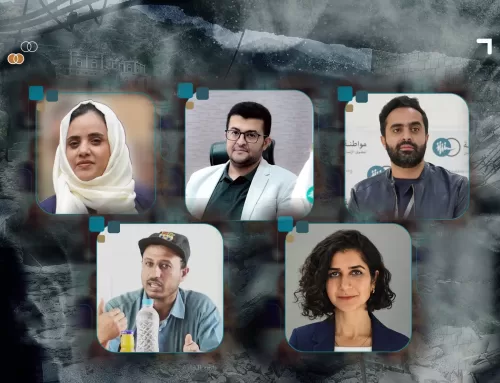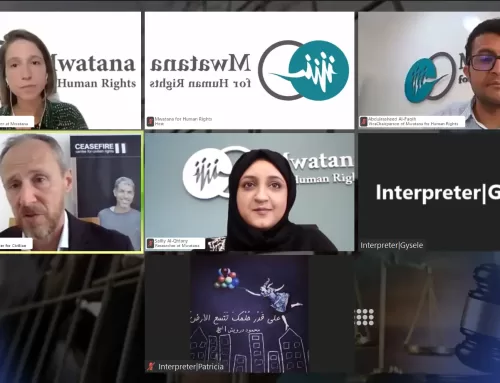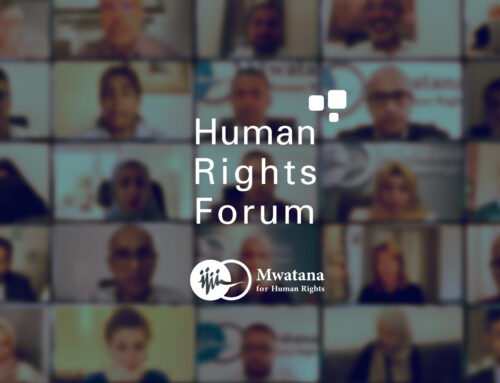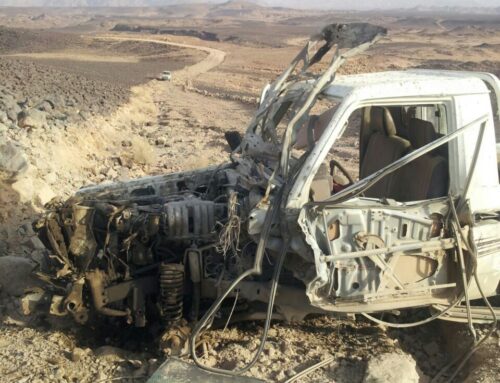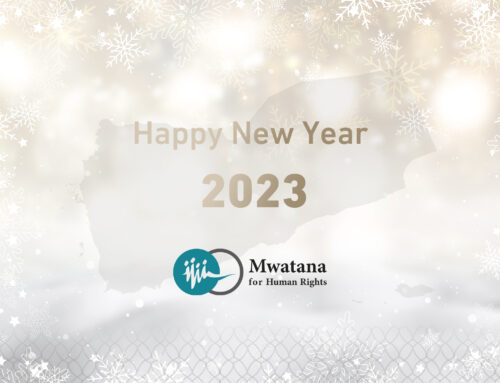Wednesday, March 6, 2019
“To watch the hearing session, click here”
Written Testimony of Radhya Almutawakel
Chairperson, Mwatana for Human Rights
House Committee on Foreign Affairs
Subcommittee on the Middle East, North Africa, and International Terrorism
Hearing on “The Humanitarian Crisis in Yemen:
Addressing Current Political and Humanitarian Challenges”
Chairman Deutch, Ranking Member Wilson, distinguished Subcommittee Members,
My name is Radhya Almutawakel, and I am the Chairperson of Mwatana for Human Rights. Thank you for providing me the opportunity to speak with you today about how Congress can help end the conflict and the humanitarian and human rights crisis in Yemen.
Mwatana is an independent Yemeni human rights organization seeking to defend human rights and end abuses. Mwatana’s 70 staff members from across the country work in almost all Yemeni governorates, documenting human rights violations committed by parties to the conflict, local authorities, and armed groups. These women and men have difficult and dangerous jobs; but they continue their work because they know that for humanity to be preserved, the brave among us must stand up in the face of abuses.
I am here today to urge that Congress also stand up in the face of abuses, and take concrete action to help end civilian suffering in Yemen. Congress has the power to change the fates of millions of Yemeni civilians who bear the brunt of this war. But you must choose to do so.
In 2018, 22 million Yemenis were in need of assistance. In 2019, that number increased to 24 million—80 percent of the population, more people than live in Florida. 10 million of them – twice the population of South Carolina – are now on the brink of famine.
It is a man-made humanitarian crisis, and one which cannot be addressed without stopping human rights violations; neither of these challenges can be resolved unless this inhuman war is brought to an end, and the parties held accountable. Peace is possible in Yemen; there just needs to be the will to pursue it.
Yemenis are not starving, they are being starved. Parties to the conflict are using starvation as a weapon of war. They are blocking aid, impeding commercial imports, and destroying critical infrastructure. Saudi Arabia and the United Arab Emirates have blockaded Yemen’s ports – delaying and obstructed inbound cargo vessels to the point that many private shippers have given up – and have shut the country’s main airport in Sana’a for more than two years. The Houthis, supported by Iran, have obstructed humanitarian assistance, and created a war economy that prioritizes their personal enrichment over public services. Hundreds of thousands of Yemeni civil servants—upon whose income millions of families depend—have not received their salaries since 2016. The Hadi government refuses to pay them.
No side in this war has a clean record. Since September 2014, Mwatana has documented hundreds of international humanitarian and human rights law violations; in which thousands of civilians have been killed and injured and civilian objects damaged and destroyed. Civilians have been victims from all parties to the conflict: the Ansar Allah armed group, also known as the Houthis, the Saudi/Emirati-led coalition (SELC), UAE proxy forces, and President Abd Rabou Mansoor Hadi’s government of Yemen and the fighting forces and armed groups that pledge loyalty to him.
Every day the war in Yemen continues, it undermines Yemenis’ dream of a functioning state based on equal rights and rule of law. The war has put most of Yemen and the millions of people in it under the de facto control of armed extremist groups: The Houthis, and a range of armed groups that have pledged loyalty to the Hadi government or the Saudi/UAE coalition, and established themselves based on regional and tribal backgrounds.
The war in Yemen is not a distant tragedy with no connection to America. Since 2015, the United States has supported the bombardment of Yemeni civilians by Saudi Arabia and the United Arab Emirates. The United States has sold Saudi Arabia and the UAE billions of dollars’ worth of bombs and other weapons, and has provided logistical, intelligence, and political support to the Saudi/UAE military campaign.
Many Members of Congress expressed outrage last week over CNN reports showing weapons that America sold to Saudi Arabia and the United Arab Emirates ending up in the hands of extremist armed groups. You are right to be angry that Saudi Arabia and the UAE would be so reckless when you entrusted them with U.S. arms. But you should not have been surprised.
For nearly four years, Saudi Arabia and the UAE have used American weapons to commit violations against Yemeni civilians. Saudi Arabia and the UAE have bombed weddings and funerals; homes and hospitals; fishing boats and schools. Since March 2015, Mwatana has documented over 300 attacks conducted by the Saudi/UAE-led coalition in 13 Yemeni governorates that appear to violate international humanitarian law. These attacks have killed at least 3250 civilians and injured at least 2547 others. The indiscriminate and disproportionate airstrikes have contributed to the humanitarian crisis by damaging or destroying critical civilian infrastructure.
Mwatana also has identified remnants of U.S.-made weapons at the sites of at least 25 apparently unlawful Saudi/UAE-led coalition airstrikes in Yemen. Scores of children and women were among the dead and wounded. Many of the attacks took place far from any potential military target; others failed to abide by international humanitarian law’s proportionality requirement, in that they caused harm to civilians that vastly outweighed any possible military benefit. In no case did we find any evidence that Saudi/UAE coalition forces took the necessary steps to minimize harm to civilians, as is required.
Some of these attacks are likely war crimes. Many of them used American-made bombs and munitions. Every single one of these attacks destroyed innocent lives. The real tragedy is that much of this could have been prevented had Congress stood up in the face of years of credible reporting on Saudi/UAE abuses in Yemen.
In 2016, Saudi Arabia bombed a Sana’a funeral hall using U.S. munitions, killing and maiming hundreds. That should have been the turning point. It was a likely war crime—any possible military justification grossly outweighed by the easily foreseeable and immense civilian harm.
Then, Congress should have stood up and stopped U.S. arms sales until unlawful attacks ended and war criminals were held accountable.
But the United States did not do that. Instead, you accepted Saudi and Emirati promises that the violations would end, and those responsible would be investigated and held accountable. Almost two and a half years later, accountability remains lacking. Saudi/UAE investigations, conducted by their Joint Incidents Assessment Team (JIAT), do not meet international standards. No clear mechanism for redress exists. And Yemenis continue to be killed and maimed by airstrikes, and pushed ever closer to starvation, because of the way this war is being waged.
It is clear that those Saudi and Emirati promises were empty.
Also empty, after four years of war, is the hope among so many Yemenis for the future. More and more of us feel overwhelmed and full of sorrow at how the world seems to have abandoned Yemen. For four years, our cities, streets, and families have been destroyed. What terrifies us is that the war in Yemen is expanding every day to more and more villages and cities, bringing hunger, loss, fear, and death. In the short time I’ve been talking to you, another child in Yemen has died of starvation, disease, or war inflicted wounds.
The war empowers and feeds extremist groups, creating ticking bombs for the future.
The Houthis run areas under their control with the mentality of an armed group. They operate with impunity, as they continue to wage bloody and indiscriminate ground attacks against civilians and civilian sites, and to commit grave violations of human rights and international humanitarian law, including arbitrary detentions, enforced disappearances, torture, and laying of landmines. The Houthis also obstruct humanitarian access and profit from taxation of commercial imports in what has become a war economy.
Southern parts of Yemen and some areas in the north are ostensibly under the control of the Hadi government, but authority is actually wielded by proxy forces and armed groups principally backed by the UAE. These groups run areas under their control with the same mentality of impunity as the Houthis. Instead of building government institutions and enforcing the rule of law, the areas under the control of Saudi and UAE proxies have become an open space for extremist groups to grow, for violations against civilians to proliferate without accountability. Hundreds of civilians have been arbitrarily detained, forcibly disappeared, or tortured in secret prisons by the UAE or UAE-backed armed groups in the south.
Only building a state, enforcing the rule of law, and ensuring accountability can stop the different armed groups currently proliferating throughout the country. The warring parties depend on the total absence of accountability and expect their allies to allow the status quo to continue. Their disregard for international law and for the millions of civilians suffering in Yemen will only grow with each new abuse they are allowed to commit with impunity. Saudi Arabia, the UAE, the Houthis, and other armed groups feel they have a green light to do whatever they want, however horrible it may be, because they do not believe anyone will stand up in the face of their abuses.
But Congress has the power to stop this. Yemen can’t wait another four years.
We saw significant new attention to Yemen following the outrageous murder of Saudi journalist Jamal Khashoggi. Like Khashoggi’s killing, the war in Yemen is a reckless adventure – only in Yemen, it is tens of thousands who are being killed, and millions who are suffering at the hands of the Saudi/UAE-led coalition, the Houthi armed group, and other parties to the conflict.
We saw in Sweden last December how the international community can, when it chooses, find the political will to really pressure the parties to the conflict to take steps to end the war. The December Stockholm talks opened the most important window towards peace since the beginning of the conflict. Now is the time to build on that effort. But this tentative progress will succeed, and overcome the many challenges ahead of it, only with sustained international attention and pressure, especially from Congress.
Congressional debates and votes on Yemen last December and earlier this month brought significant pressure on the conflict parties to take steps toward ending the war. Continuing that pressure would contribute to alleviating the suffering of millions of civilians.
By ending U.S. arms sales and military and logistical support to Saudi Arabia and the United Arab Emirates, Congress can make clear that you do not accept and will not continue the status quo in Yemen – because the status quo means American allies using American weapons to kill, maim, and starve Yemeni civilians with impunity. This would be a very significant first step toward accountability and peace.
Earlier this month, the United States pledged millions of dollars in aid for Yemen at a pledging conference in Geneva. Though the American contribution ranked only twelfth among donors, it is still certainly welcome. But I am afraid that if U.S. arms sales to Saudi Arabia and the United Arab Emirates continue, American bombs will reach Yemen’s suffering civilians before American aid will.
If Congress stands up in the face of abuses in Yemen, you can help end the worst humanitarian crisis in the world. Peace in Yemen is still possible, but to achieve it, Congress must act.
Thank you.
—
Oral Testimony of Radhya Almutawakel
Chairperson, Mwatana for Human Rights
House Committee on Foreign Affairs
Subcommittee on the Middle East, North Africa, and International Terrorism
Hearing on “The Humanitarian Crisis in Yemen:
Addressing Current Political and Humanitarian Challenges”
Wednesday, March 6, 2019
Chairman Deutch, Ranking Member Wilson, Subcommittee Members,
Thank you for the opportunity to speak with you today. I will summarize my written statement, which I submit for the record.
Mwatana for Human Rights documents violations by all sides in Yemen. It is a dangerous job, but our 70 staff, men and women, know that for humanity to be preserved, the brave must stand up in the face of abuses.
Today I urge Congress to do the same.
Congress has the power to change the fates of millions of Yemeni civilians, but must choose to do so.
24 million Yemenis need humanitarian aid – more people than live in Florida.
10 million are on the brink of famine – twice South Carolina’s population.
It is a man-made crisis. Yemenis are not starving; they are being starved. The humanitarian crisis cannot be addressed without addressing the human rights situation.
The war in Yemen is not some distant tragedy with no connection to America.
Since 2015, the U.S. has supported Saudi and Emirati attacks on Yemeni civilians – by selling billions in bombs and other weapons, and providing military and political support.
After four years of war, Yemenis are losing hope for a country based on rule of law. Most now live under de facto control of armed extremist groups.
On the one hand, the Houthis, supported by Iran, commit terrible abuses, such as indiscriminate attacks, disappearances, and landmines.
On the other hand, armed groups loyal to the Hadi government and Saudi-Emirati coalition also commit horrible violations.
All these armed groups act with impunity – because they think no one will stand up in the face of their abuses.
But neither does the Saudi-Emirati coalition.
When CNN recently showed U.S. weapons sold to Saudi Arabia and the United Arab Emirates in the hands of extremist armed groups, Congress was right to be angry at this recklessness.
But you should not have been surprised.
Because since 2015, the Saudi/UAE coalition has used U.S. weapons recklessly, to kill and maim Yemeni civilians. Mwatana has documented hundreds of attacks killing and maiming thousands of civilians and destroying key infrastructure. We found U.S. bomb remnants at dozens of these airstrikes.
Many are likely war crimes.
Every single one destroyed innocent lives.
The 2016 Saudi bombing of a Sana’a funeral hall using U.S. munitions, killing and maiming hundreds, should have been a turning point.
Congress should have stopped arms sales until unlawful attacks ended and war criminals were held accountable. Instead, the U.S. accepted Saudi and UAE promises to end violations and investigate.
Two years later, there has been no accountability, and airstrikes on Yemeni civilians continue.
Yemen can’t survive another four years. In the short time I have been talking to you, another child has died because of war inflicted wounds, starvation, or disease.
Congress has the power to stop this.
Attention to Yemen increased after the outrageous Khashoggi murder.
The Stockholm talks showed that the international community can push to end the war.
But this tentative progress needs sustained global pressure, including from Congress. Your recent votes on Yemen drove the parties to take small steps toward peace.
By ending U.S. arms sales and military support to Saudi Arabia and the United Arab Emirates, Congress can stop American allies from using American weapons to kill Yemeni civilians with impunity.
This would be a significant step toward accountability and an end to the war.
This month, America pledged millions in humanitarian aid for Yemen. But if U.S. arms sales to Saudi Arabia and the United Arab Emirates continue, American bombs may reach Yemeni civilians before American aid will.
Peace in Yemen is possible. But to achieve it, Congress must act.
Thank you.


